How a Ukrainian prisoner of war survived Russian captivity and made it home
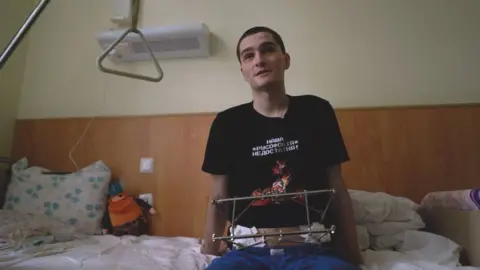 BBC
BBCHlib Stryzhko endured psychological torture and was denied medical treatment for a broken pelvis and jaw. Yet somehow, he made it home.
In a hospital bed in the Ukrainian city of Poltava, he tried to sit up.
The 25-year-old soldier's pelvis was supported by metal scaffolding - one of his many injuries sustained while trying to defend Mariupol, nearly 500km to the south.
As his mother Olesya helped him he grimaced with pain, but seemed eager to share his story nevertheless.
"Turning my head, I saw that a tank was aimed at me," he recalled.
"When a tank fires, there is no time between exit and arrival. It happens instantaneously. I saw a bright flash."
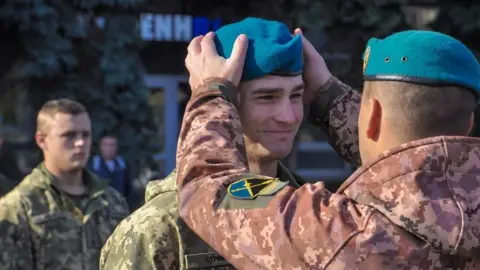
He fell three storeys when the tank fired.
"I realised I could either shout and be helped or die under this rubble," says Mr Stryzhko.
"Every cry was an extraordinary effort. After three to four screams, I heard the guys saying 'we are here, we'll help you'."
Mr Stryzhko's comrades saved his life and took him to a field hospital.
"There were around a dozen guys from different units," he remembered. He was not, however, out of danger.
"The doctors arrived and told us that in order to save our life we will be passed to the Russians."
Invading troops were taking more of Mariupol, and the soldier's best chance of getting medical attention was with the enemy.
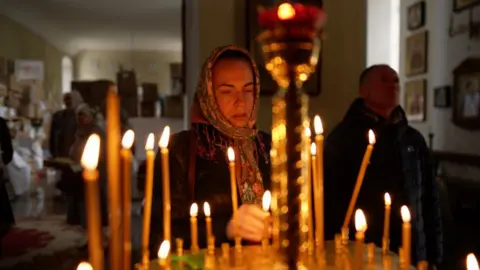
Meanwhile, in his hometown of Poltava, the church he has been involved with since childhood prayed for him.
Like many Ukrainian institutions, the city's Assumption Cathedral has had to adapt to the war - boxes filled with humanitarian aid now fill its halls.
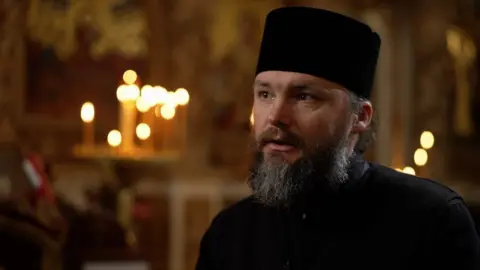
"I knew there were only two ways out of Mariupol: death or captivity," says the city's Archbishop Fedir, who still conducts services from the church's imposing alter.
The Archbishop believed Mr Stryzhko wouldn't surrender, but had no idea whether he was dead or alive.
That changed when the marine appeared with other Ukrainian prisoners on a social media post by Russian-backed separatists.
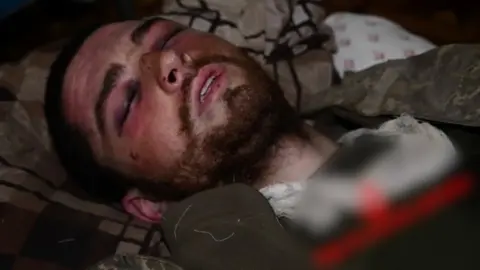
"I knew that God had performed a miracle," says the archbishop. "He was in a difficult condition, with numerous fractures."
Mr Stryzhko had suffered a broken pelvis and jaw, and had lost vision in one eye.
The archbishop was worried, but relieved to see Mr Stryzhko alive.
"God answered our prayers, and I was confident that we would be able to free him from captivity," he said.
Archbishop Fedir says there are more marines from Poltava who went missing in Mariupol, which is now under Russian control after 80 days of siege.
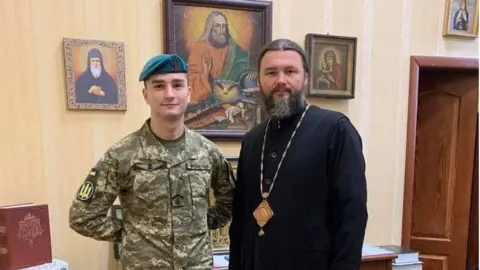
Back in Mr Stryzhko's stuffy hospital room, he recalled his treatment by the Russian side, or lack of it.
"Some nurses would bring food and feed me, as I could not sit and had my jaw broken," he says.
"The others would put the food down and say: 'Try and eat that, you Ukrainian low life!'" Mr Stryzhko's injuries meant that he could not feed himself.
"The food stayed for several hours untouched. She came back asking if I was full and took it back. We were there without any anaesthetics. I believed I had to survive; it was all I could do."
These medical staff were Russian-supporting Ukrainians living in the occupied areas of Donbas. Mr Stryzhko says he didn't feel angry towards them. "They lived under Russian propaganda for eight years, and the hatred I experienced was a result of this."
He remembers the Chechen fighters and Russian soldiers guarding them. The Chechens would come at night and taunt him running a knife along his body. "Too bad it is forbidden to cut off your ear," they said, watched by the Russian soldiers.
We haven't been able to independently verify the 26-year-old's claims.
Mr Stryzhko was eventually taken to Russia and then flown to a military airfield in Russia-annexed Crimea, where he says he'll never forget what a Russian soldier told him, 17 days after his ordeal started.
"If you follow my orders, you will be in Ukraine this evening."
The marine was loaded onto an ambulance and taken towards Ukrainian territory. It turned out he was part of an agreed prisoner exchange between Ukraine and Russia.
He was taken north to a hospital in Zaporizhzhia, which is under Ukrainian control, and then onto his home city of Poltava in the north.
Mr Stryzhko described tears falling down his face when he realised he was back home.
The soldier was one of a dozen Ukrainian troops returned, all marines from different units injured while defending the Illich steel works in Mariupol.
"Another driver approached and said: 'Calm down, you are in Ukraine now'."
"I was very happy," he said. "I could not even believe that I was in Ukraine, a place where you can breathe freely."
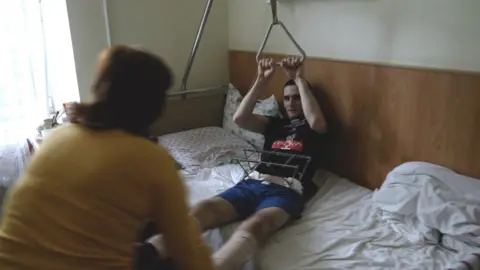
Despite the concerned look on his mother's face, he had no doubt what he wanted to do next.
"I am ready to continue my fight. It could be both at the frontline or somewhere else. I will help the army to bring victory over Russia closer."
He was then helped back into a horizontal position, straining, but smiling.
Additional reporting by Hanna Chornous, Siobhan Leahy and Anastasia Levchenko.
